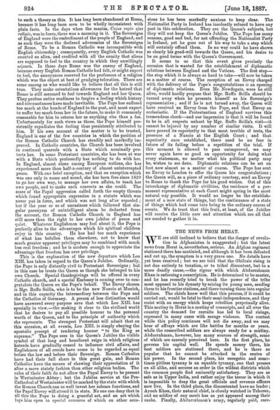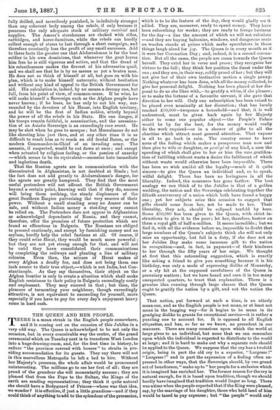THE NEWS FROM HERAT.
WE are still inclined to believe that the danger of revolu- tion in Afghanistan is exaggerated ; but the latest news from Herat is, nevertheless, serious. An Afghan regiment stationed there has mutinied, and although it has been defeated and cut up, the symptom is a very grave one. No details have yet been received ; but we are told that the Ghilzaie rising is not due entirely to taxation, or to tribal discontent, but to a more deadly cause,—the rigour with which Abdarrahman Khan is enforcing a conscription. He is determined to be master, and he has recently tried to break the power of the tribe most opposed to his dynasty by seizing its young men, sending them to his frontier stations, and there turning them into regular soldiers. The chiefs know well that this process, if it could be carried out, would be fatal to their semi-independence, and they resist with an energy which keeps rebellion perpetually alive. This mutiny in Herat is a mutiny of conscripts, and all over the country the demand for recruits has led to local risings, repressed in many cases with savage violence. The contest while this policy continues will not die away, and we may hear of affrays which are like battles for months or years, while the conscribed soldiers are always ready for a mutiny. Abdurrahman, however, has many sources of strength, some of which are scarcely perceived here. In the first place, he governs his capital well. He spends money there, his best soldiers are stationed there, and he is there so popular that he cannot be attacked in the centre of his power. In the second place, his energetic and some- times pitiless tyranny is an equable tyranny, one that presses on all alike, and secures an order in the wildest districts which the common people find eminently satisfactory. They are as safe as in Upper India, and rather enjoy the terror in which it is impossible to deny the great officials and revenue officers now live. In the third place, the discontented have no leader ; Ayoub Khan, their natural chief, is closely watched in Teheran, and no soldier of any merit has as yet appeared among their ranks. Finally, Abdurrahman's army, regularly paid, care-
fully drilled, and mercilessly punished, is indefinitely stronger than any coherent body among the rebels, if only because it possesses the only adequate stock of military materiel and supplies. The Ameer's storehouses are choked with rifles, cartridges, and horse-furniture, while the rebels can hardly collect enough of stores to last through a short campaign, and therefore constantly lose the profit of any small successes. Add to these facts the greater one that Abdurrahman is far the beat soldier in his own dominions, that whenever the gout leaves him free he is still vigorous and active, and that the dread of his relentlessness makes the fiercest of his adversaries quail, and we shall see that he is by no means as yet a beaten man. He does not no think of himself at all, but goes on with his plan, which is to make himself autocratic, without hesitation and without any kind of appeal to the British Government for aid. His calculation is, indeed, by no means a dreamy one, but full, from his point of view, of common-sense. If he wins, he will make himself a Sovereign such as the Afghan people have never known ; if he loses, he has only to cut his way, sur- rounded by the devotees of his House, into English territory, and he will be the first of Indian nobles, utterly beyond the power of all the rebels in his State. His one danger, if his troops remain faithful, is assassination, and the assassina- tion of an Asiatic Sovereign is an exceedingly rare event. He may be shot when he goes to mosque ; but Mussulmans do not like shooting him just then, and at any other time it is as difficult to reach him as to reach an old feudal Baron, or the modern Commander-in-Chief of an invading army. The assassin, if suspected, would be out down at once ; and except when actuated by religious feeling, or the passion of anarchy —which seems to be its equivalent—assassins hate immediate and inglorious death.
That the Russian agents are in communication with the discontented in Afghanistan, is not doubted at Simla ; but the fact does not add greatly to Abdurrahman's danger, for the agents are greatly hampered. They find that the most useful pretenders will not affront the British Government beyond a certain point, knowing well that if they do, success will bring them nothing, the steady displeasure of the great Southern Empire pulverising the very sources of their power. Without a small standing army no Ameer can be safe, and without Indian money a standing army cannot be relied on. The Pretenders dare not appear in Afghanistan as acknowledged dependants of Russia, and they cannot, therefore, offer the promises of future protection which are found so efficacious in Bulgaria. The Russians are obliged to proceed cautiously, and except by furnishing money and an asylum, hardly help the rebel factions at all. Of course, if they could seize Herat, they would be much more powerful ; but they are not yet strong enough for that, and will not be until they have consolidated their communications by completing the railways and planting a line of military colonies. Even then, the seizure of Herat makes of every Afghan a deadly foe, and does not bring them one inch nearer to their true object,—which is not India, but Con- stantinople. As they say themselves, their object on the Afghan frontier is only to create a situation which shall make English resistance to their policy in Bulgaria exceedingly costly and unpleasant. They may succeed in that ; but then, the pleasure of tormenting your neighbour, though exceedingly attractive, is not equivalent to succeeding for yourself, more especially if you have to pay for every day's enjoyment heavy sums in hard cash.



































 Previous page
Previous page